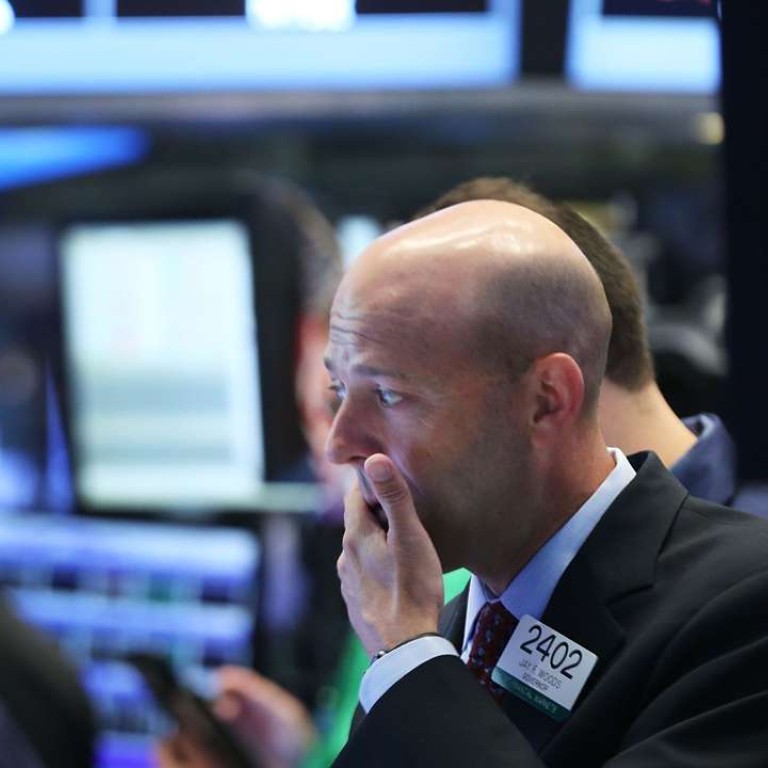
Hong Kong stocks close fractionally lower, narrowing earlier losses but sell-off in UK-exposed shares continues for third day
Hang Seng Index eases 0.27 per cent; Shanghai Composite tacks on 1.2 per cent
Hong Kong stocks continued their losses on Tuesday, declining for a third straight trading day under the cloud of Brexit and following a sell-off in the stock markets in the United States and Europe overnight.
The Hang Seng Index closed down 0.27 per cent or 54.84 points to 20,172.46, narrowing losses after the benchmark opened the morning 328 points lower.
The Hang Seng China Enterprises Index fell 0.36 per cent or 31.05 points to close at 8,536.16, also paring a steeper decline at the open.
Among sectors, insurance, hotels and entertainment led the declines, while retailers gained.
Wilson Tang, equities specialist head at DBS Bank Hong Kong, said the recent rebound of Hong Kong local retailers comes after they were “oversold” as a result of a long running bear market. Tang said the further strength of the yen may encourage more tourists from Japan to visit Hong Kong, which partly explains the share price gains in the city’s retailers.
Linus Yip Sheung-chi, First Shanghai Securities chief strategist agreed, saying that some investors are betting on a rebound of local retailing stocks after their shares fell over 50 per cent in past two years.
“The fall of property prices in the city also added to expectations that retailers would spend less on rental payments,” added Yip. “The worst time for retailing stocks may have past, but it is hard to say whether the spring has coming.”
Esprit Holdings increased 3.29 per cent to HK$ 5.65 after chairman Raymond Or Ching-fai said it would cut 10 per cent of its headcount in Germany. Regal Hotels International added 2.2 per cent to HK$ 3.68.
However, stocks with business exposure to Britain and Europe extended their losses for the third trading day in a row, while Cathay Pacific Airways and Macau casino stocks also fell further.
CK Hutchison Holdings remained the worst performing blue chip, with its shares sliding 1.80 per cent to HK$82.00.
Cheung Kong Infrastructure Holdings’ shares fell 2.63 per cent to HK$64.75, its lowest level since September 2015. Power Assets slid 0.73 per cent to HK$67.65.
HSBC shares fell 0.64 per cent to HK$46.35 while Standard Chartered lost a further 2.1 per cent to HK$55.95.
Lenovo Group shares fell 1.72 per cent to HK$4.58, their lowest level in over four years, after Bank of America Merrill Lynch lowered its target price from HK$4.6 to HK$4.5 on concerns that the computer maker’s business in Europe would be affected by weaker local currencies and an economic slowdown after Brexit.
Yip said the mainland and Hong Kong economies are not among the major losers following Brexit, while Hong Kong stocks were dampened by the poor performance of US and European markets.
“Investors should closely monitor the stability of foreign financial markets after the Brexit, as well as the Hong Kong Interbank Offered Rate (Hibor). The rise of Hibor indicates the tightening of the local capital pool and is a sign of capital flight,” Yip said.
The one-week Hibor stood at 12.73 per cent on Tuesday, one of its highest points in a year, according to data from The Hong Kong Association of Banks.
Tang from DBS said he is cautious towards the performance of Hong Kong stocks in the second half of this year. “We need to closely monitor sterling and euro in the future,” said Tang. “Currencies in emerging markets are vulnerable to decline if sterling continues its slump. And stock markets will be inevitably hit.”
Mainland markets were unscathed by the continuing uncertainty of Brexit. The Shanghai Composite Index closed 0.58 per cent higher to 2,912.56 while the CSI 300, which tracks the large companies listed in Shanghai and Shenzhen, added 0.51 per cent points to close 3,136.40.
The Shenzhen Composite Index gained 1.22 per cent or 23.68 points to 1,970.38 while the Nasdaq-style ChiNext edged up 1.14 per cent or 24.90 points to 2,216.71.


